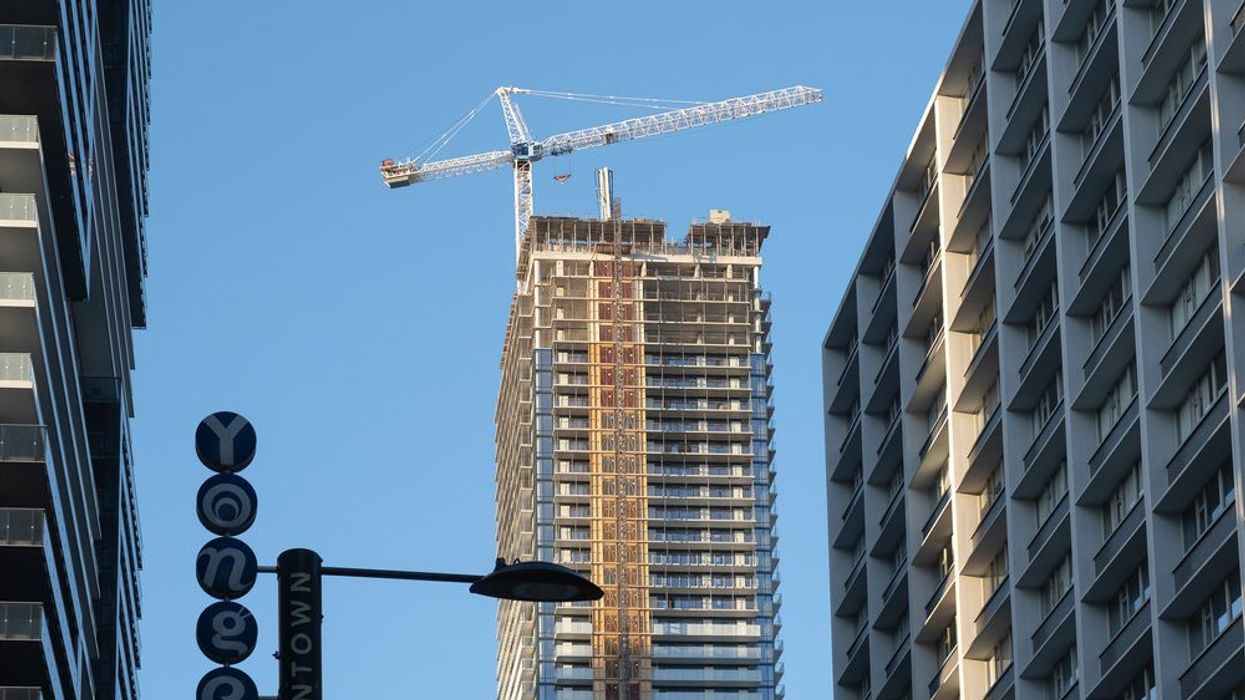The residential construction industry is experiencing the biggest labour strike in 20 years -- and that could spell dire implications for the creation of new housing supply in the Greater Toronto Area.
A number of members from Labourers’ International Union of North America (LiUNA) Local 183 union -- who work in various aspects of the low- and high-rise construction sectors -- rejected proposed settlements following the expiration of collective bargaining agreements on April 30, in the name of fair compensation and workers’ rights. Those striking include skilled trades who work in the High-Rise Forming, Self-Levelling Flooring, House Framing, Tile Installing, Railing Installing, and Carpet and Hardwood Installing sectors.
In all, over 15,000 skilled construction labourers have set down their tools and have taken to the picket lines. The affected areas include the GTA, as well as parts of southern, eastern, and southwestern Ontario.
READ: Canada Desperately Needs More Immigrants with Specialized Trade Skills as Shortage Looms
Under The Ontario Labour Relations Act, construction strikes in the GTA can last about six weeks before a return to work is mandated, with any outstanding disputes handed over to binding arbitration.
The Local points out that these are mature collective agreements -- some of which have been in place for over 30 years. However, as the cost of living has spiked, workers are demanding increased compensation. They’re calling on the Contractors’ Associations to return to the bargaining table with employment terms that address the impact of inflation, and employment terms and conditions that better reflect the current cost of living, as well as anticipated increases in inflationary pressures.
“LiUNA Local 183 members were deemed essential throughout the pandemic and continue to serve in one of the GTA’s fastest growing construction sectors,” said Jack Oliveira, LiUNA Local 183 Business Manager. “Our members are at the frontlines of the region’s growth and deserve fair pay and benefits for their work and service to the community.
“The residential sector is amongst the most in-demand industries for the GTA and will continue to be sought after for years to come. They deserve compensation that reflects their contributions to the industry. Our members work hard and are critical to building housing across the GTA. We’re ready to get back to work, but the Contractors’ Associations needs to offer a fair proposal that respects our members and the work that they do.”
READ: Getting Homes Built Faster is Just the Start in Addressing Ontario’s Supply Woes
According to the Residential Construction Council of Ontario (RESCON), many of the 30 collective agreements within the residential construction sector were settled this weekend, including a wage dispute for direct employees that went into arbitration on April 21, with approximately $12,500 in annual compensation awarded. However, the job action taken by these key housing sectors will pose considerable challenges for the creation of new supply in the region.
“This is going to create some delays. The longer a strike goes, the longer the delay, needless to say, but it takes that much longer to get things back on track and rescheduled," says RESCON President Richard Lyall. "So it’s particularly challenging that way -- and then to add to all this, the financial markets are in considerable turmoil and the forecast seems to be pointing very clearly to further rate hikes coming, anywhere from, depending on if you’re in Canada or the U.S.,100 to even 400 basis points. The interesting quirk there would be, if we do get pushed into a slowdown or recession, that will have a deflationary effect rather than a stagflationary effect. But it’s a very complex set of circumstances that are coming together at the same time.”
However, he adds he's hopeful talks will be fruitful in the short term as "there’s really no purpose for anyone, being served by going the full six weeks of strikes -- it just doesn’t make sense.”
“We’re going from the frying pan and into the fire. The Labourer's Union are saying there’s no recognition for the men’s settlements; well, there’s been eight or nine settlements so far, plus we had three arbitrations yesterday -- and there’s very real money on the table -- but sometimes expectations can sometimes exceed reality.”
Costs and Delays to Trickle Down to Buyers
In all, homebuyers can expect to see costs rise as a result of this job action, David Wilkes, BILD President and CEO, tells STOREYS.
"The current labour action by unions in the residential construction industry in the GTA is yet another factor contributing to limiting home supply and affordability in the GTA. Based on the recent new home sales data for March 2022 released by BILD and Altus in April, new home supply is near or at historic low levels," he wrote in a statement. "Material cost increases and supply chain disruptions caused by COVID are driving up the cost of building new homes, while at the same time municipalities across the region are seeking to add more costs in the form of higher development charges and parkland charges. While the impacts of strikes may be time bound, the work stoppages, knock on effects and ultimate settlements will impact supply and product cost."
Recent pledges by both federal and provincial governments to significantly increase housing supply over the next decade have put fresh pressure on the industry, which has grappled with supply chain challenges, and the skyrocketing cost of materials, along with a skilled trade shortage.
“The residential construction industry is a critical part of Ontario’s economy,” says Lyall. “Housing is a need, and the industry was considered essential throughout the pandemic. All sectors of construction are important, and labour, management and government did a good job working together during the pandemic. We are encouraged that a number of collective agreements have been settled. However, there is no reason for work stoppages, and we hope that the arbitrated settlement will encourage other parties to return to the bargaining table and reach an agreement."





















